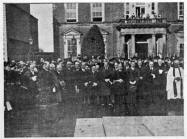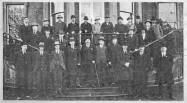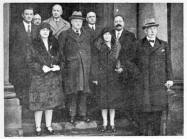|
1st LISBURN CO. VOLUNTEERS
|
Sweet Lisburn, fairest village of the vale,
Thy beauties have and always shall prevail.
The loveliest town, of all the northern plain,
Whose worthy sons, did their rights maintain.
Who for sweet liberty, in days of yore,
And for their country still achieved much more;
'Gainst that bold rebel Sir Phelim O'Neill,
Who o'er thy loyal sons thought to prevail.
Who stemmed the torrent of his wicked rage
And graced the annals of historic page;
Rawdon's brave troops repelled his bloody crew,
And many in most dreadful battle slew.
Now should proud France oppose, or timid Spain,
Fair Lisburn's sons, would freely fight again.
Her Volunteers are all both firm and true,
And gallant men as ever triggers drew.
They would stand forth, maintain our wholesome laws,
And speak, and act, and bleed in Paddy's cause.
Still let the task be yours with active zeal,
To guard the honours of your country's weal;
Her rights restore, her sinking laws reclaim,
And 'wake in every breast the patriot flames.
Our spirits cheer'd, by hopes enlivening ray.
That shortly we shall see the glorious day,
When all oppressive laws shall be repealed,
And national freedom, be entailed;
Fair Lisburn's sons shall then in concert sing,
With grateful hearts `long live great George our King'. |
|
Lisburn, March 6, 1780. |
A LISBURN VOLUNTEER. |

THE Lisburn War Memorial was unveiled on Saturday, April 28, 1923, by
Major General Sir Oliver Nugent.
The Right Hon, C C. Craig, M.P., the Prime Minister of Northern
Ireland, presided and the following took part in the service: the Rev.
Canon Carmody, Rev. J. J. C. Breakey, Rev R. H. S.. Cooper, Rev. R, W.
Hamilton and Rev. B. S. Lyons.
The names of the fallen were read by Col. H. A Pakenham, D.L. and Mr.
Joseph Allen handed over the memorial to Mr. Ezekiel Bullich, chairman
of the Urban District Council, Others who spoke were Mr. E S. Clarke,
Mr. J. Milne Barbour, Mr. Thomas Sinclair, Senator H. A. M. Barbour
and Mr. James Barnes.
Combined church choirs .led the praise and a guard of honour was
formed by the Seaforth Highlanders.
Last year an additional plaque was added to the War Memorial to
commemorate those who died in the Second World War. |
MONRO - AN AMIABLE CITIZEN
DURING the troublesome time of the United Irishmen, Lisburn became a
centre of excitement and bloodshed. This was a Movement, founded in 1791,
with the idea of uniting Irishmen of all creeds and classes in one common
bond for the purpose of seeking a more equitable adjustment of
constitutional laws.
One local cleric, the Rev. Phillip Johnston, of Ballymacash House,
become so unpopular with the United Irishmen, through the exercise of his
magisterial duties, that they conspired to take his life.
Several unsuccessful attempts were made, and on one night, Saturday,
October 8, 1796, when leaving the house of a friend, Mr. Johnston was
wounded in the left shoulder. This aroused considerable indignation
locally, but despite public meetings and a reward of £1,000 the offender
was not brought to justice.
On October 23, 1796, the Habeas Corpus Act was suspended, and soon
after a number of Lisburn merchants were arrested on a charge of high
treason. From 1796 until 1798 Ireland drifted into civil war and during
the winter of 1797 one Lisburn whitesmith is recorded forging upwards of
500 pikes, besides attending to his ordinary work
The linen markets of Ulster were at this time attended . by great
numbers of buyers, and of these gentlemen one of the most respected was
Henry Munro, of Lisburn. He had been a member of the Lisburn Volunteers at
the time of their disbandment, and afterwards joined the United Irishmen.
He was a member of the Episcopal Church, a regular attender at the Sunday
services at the Cathedral, and was highly respected by the rector and the
curate.
In the month of May, 1798 preparations were made by the United men to
take the field against the Government troops. The member who had been
appointed to lead them declined at the last moment to act as ' commander,
and on the night of Saturday, June 9, Henry Munro was approached by a
Belfast lawyer (the legal adviser of the Society).

Matter of Honour
Although he had at no period before this contemplated taking the field
against the Royal troops, Munro was told, at his Market Square home, that
the only hope for the United men was that he would take , command. Looking
upon the call as a matter of honour he accepted it without considering the
magnitude of the responsibility he was about to undertake.
At the Battle of Ballynahinch, fought on Wednesday, June 13, the
insurgents were completely routed and fled in all directions. The
unfortunate general was among the last to leave the field, and for several
hours roamed about the countryside. Early on the Thursday morning he
sought shelter in a farmhouse and remained there for nearly two days
receiving great attention from his kind hearted host.
Told he must seek some other refuge Munro set off on Saturday morning
and at a farm on the outskirts of Dromore, Co. Down, offered a man £5 (all
the money he had in his possession) and a small parcel of shirts if he
would conceal him for a few days until the Government offer of pardon to
all rebels who gave up arms should be issued.
After taking the money and
offering shelter the man went to Hillsborough and told the yeomanry of
having Munro concealed in his outhouse. A guard was immediately sent for
him and the unfortunate Munro was taken prisoner.
Confined in a temporary prison in Lisburn Munro was shown the utmost
sympathy by his friends. On Monday, June 17, the trial came before a court
martial. Only three witnesses were examined for the Crown, and the
deposition that the prisoner had led the native troops at the battles
being conclusive, the sentence of death was passed.
At four o'clock Munro was brought out under a strong guard. He was
allowed to take the Sacrament at the rector's house before being taken in
procession to a temporary gallows, erected nearly opposite the woollen
drapery concern of which he was the proprietor.
Munro exhibited perfect coolness and, whilst standing at the foot of
the gallows, was given permission to speak to a friend who lived near by.
After a short prayer he stepped on the ladder, and when one of the steps
gave way he fell. On the ladder being adjusted he went up with the rope
around his neck and in a few moments it was all over.
Although his conduct was looked upon as that of the wildest and most
misguided patriotism, Munro's political opponents, as well as his friends,
mourned sincerely over a man whom everyone respected as a worthy and
amiable citizen.
When the body was taken down, the final vengance of the law was carried
out. Three other men were hanged in Lisburn about the same time -- Dick
Vincent, George Crabbe and Tom Armstrong, who suffered death on the
lampost at the corner of Castle Street, opposite the Market House - and
the heads of the four men were stuck on spikes and placed at each corner
of the market house.
Henry Munro's mother lived in Lisburn for many years after his death,
and supported herself respectably by keeping a little shop, situated on
the Sluice Bridge, in Bow Street. She survived her son by about 17 years.


Members, officials and staff of Newcastle Urban District
Council in 1924. Chairman was Mr. Thomas Sinclair (fifth from
left in front row) and town clerk was Mr. T. M. Wilson, on the
chairman's right.
|
Killultagh captain was
proud and insolent
ALTHOUGH there is little to record of Lisburn as a town before 1600, it
was one of the fastnesses of Hugh MacNeil Oge, son of Neil Oge O'Neill,
one of the Princes of Tirowen. 'Before the reign of Queen Elizabeth I
Lisnagarvagh was a small village, and is said to take its name from
Lis-na-garvoch, "the fort of the gamester", a circular rath situated on
the north side of the Wallace Park.
A "Concise History of Lisburn and Neighbourhood" written in
commemoration of the building of Largymore National School in May 1906,
recalls that Lisnagarvagh village was similar to several in the
neighbourhood. It was enclosed with deep ditches, which may have been
encompassed with strong palisades, a very high and thick rampart of earth
and timber, and well flanked with bulwarks.
During the reign of Elizabeth I a very unsatisfactory state of feeling
existed between her Government and the native Princes of Ulster. After
having failed to conquer these island chiefs by fighting, the Queen tried
to win them over by conciliation. In reply to an offer of an earldom Shane
O'Neill said by blood and birth his rank placed him above the peerage.
In the autumn of 1585, Sir Henry Sidney, the Queen's Irish Deputy paid
marked court to the Captain of Killultagh. One of the powerful and
influential Princes of the North he was the owner of a very large
territory and lord of three castles, each of which was encompassed with a
fort of great strength. They were Ennisloghlin, near Moira; Portmore, on
the borders of Lough Neagh, and a third which stood on a mound that rose
above the river Lagan and close to the tiny village of Lisnagarvagh.
The forts of the latter castle overlooked the entrance from the County
Down side of the water, and in case of invasion was well situated for
protecting the chief from every intrusion of his enemies by that route.
PROUD AND INSOLENT
The Captain of Killultagh, who looked upon the English as "the invaders of
his country" did not receive the Queen's Deputy too cordially and,
indignant at the reception accorded him Sir Henry reported: "I came to
Killultagh, which I found ryche and plentyful after ye manner of those
countreys, but ye captain was proud and insolent; he would not leave his
castle to see me, nor had I apt reason to vyste him as I would. He shall
be paid for this before long. I will not remain long in his debt".
The Queen, on hearing of
the cool contempt with which O'Neill treated her deputy, became more
determined to subdue the Irish Chieftains, and three famous commanders
were sent to Ireland to put down, at any cost of men and money, the
princely powers of the O'Neills.
In 1587 such overtures were made in favour of peace to the heads of
clans, and offers of full pardon, that Brian McArt O'Neill and his father,
the Captain of Killultagh, pledged themselves and their tenants, that they
would submit to English rule. Sir John Perrot accepted the promise in the
name of Her Majesty, but when Hugh O'Neill, Earl of Tirowen, rose once
again the Captain and his son forgot their promse and joined their
kinsman's army.
An expedition in 1602, under Lord Mountjoy captured their Fort
Ennisloghlin and after terrible suffering endured by his adherents,
O'Neill submitted to the officers of the Queen.

A GENEROUS BENEFACTOR
Granted a full pardon, a new patent for his lands, except certain portions
for chieftains received into favour and for the use of English garrisons,
O'Neill was in Dublin at a meeting of the Council when he heard of the
Queen's death. Bursting into tears the Irish chieftain said it was at the
loss of a mistress whose moderation and clemency had at last caused him to
regard as a generous benefactor. His enemies said he was mortified at his
hasty submission, and that he regretted not having held out longer when he
might have benefited by the change and made better terms.
| Be that as it may, with
the passing of Queen Elizabeth passed also away the independence and power
of the O'Neills, Earls of Tirowen, Captains of Killultagh and the Lord of
Lisnagarvagh. |

Lord and Lady Hailsham photographed during a visit to Lisburn
Technical School in 1926. Originator of the London Polytechnic
the Lord Chancellor was keenly interested in the development
of local education.
Also in the picture are Mr. James Barnes, chairman of the
Lisburn Urban Council and Lord and Lady Craigavon. |

|